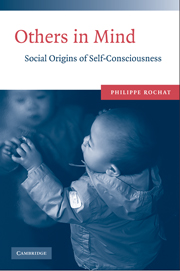Book contents
- Frontmatter
- Contents
- Foreword by Jerôme Bruner
- Preface
- Introduction: Main Ideas
- 1 Self-Conscious Species
- 2 Six Propositions
- 3 Varieties of Self-Reflective Mind State
- 4 Mind States in Development
- 5 Birth of Self-Consciousness
- 6 Shame and Self-Knowledge
- 7 The Roots of Guilt
- 8 Giving and Sharing
- 9 Origins of Owning and Sharing
- 10 Social Construction of Identity
- Conclusion: Moral Space and the Self
- Postscript Note
- References
- Index
4 - Mind States in Development
Published online by Cambridge University Press: 05 August 2012
- Frontmatter
- Contents
- Foreword by Jerôme Bruner
- Preface
- Introduction: Main Ideas
- 1 Self-Conscious Species
- 2 Six Propositions
- 3 Varieties of Self-Reflective Mind State
- 4 Mind States in Development
- 5 Birth of Self-Consciousness
- 6 Shame and Self-Knowledge
- 7 The Roots of Guilt
- 8 Giving and Sharing
- 9 Origins of Owning and Sharing
- 10 Social Construction of Identity
- Conclusion: Moral Space and the Self
- Postscript Note
- References
- Index
Summary
In the preceding chapter, I distinguished a variety of six general mind states that capture, at minimum, what is happening in the adult mind when awake. This distinction is not purely abstract and theoretical, not the result of mere introspection and armchair speculation. It is empirically based, informed by developmental observations and a natural history of mind states as they appear to emerge in the first months of life. Here I review these observations in support of the proposed mind state distinction.
The question of interest here is what constitutes the states of the mind at the beginning of life and how do these states unfold eventually to reach the state of co-consciousness (i.e., self-co-consciousness).
You can see already that co-consciousness is not construed here as any kind of acquired mind state but rather the culmination of a development, possibly unique to our species. Be reminded that the main argument of this book is that co-consciousness is at the root of what makes us human, and in particular the self-conscious species we are, a species that is unique for its obsession with others as evaluators of the self.
On the basis of selected developmental research, I will discuss the emerging signs of co-consciousness in the developing child. The goal is to understand what co-consciousness is made of by looking at how it develops as children engage in increasingly complex transactions with people and things in the world.
- Type
- Chapter
- Information
- Others in MindSocial Origins of Self-Consciousness, pp. 61 - 85Publisher: Cambridge University PressPrint publication year: 2009



